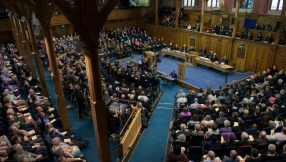
Scotland’s First Minister, John Swinney, has confirmed he will vote against the controversial Assisted Dying for Terminally Ill Adults (Scotland) Bill, ahead of its pivotal Stage 1 vote set for Tuesday evening.
His announcement adds significant weight to the growing list of high-profile MSPs voicing opposition to the draft legislation, which seeks to legalise medically assisted death for terminally ill adults.
The Bill, introduced by Liberal Democrat MSP Liam McArthur, has sparked intense debate within Holyrood and beyond, with supporters arguing it offers dignity in death and relief from prolonged suffering and critics warning of unintended consequences for vulnerable groups.
Speaking to BBC Scotland, Swinney said he had reached his decision after “agonising” over the matter: “I’ve come to the conclusion that I can’t support [the legislation] because I’m worried that it would fundamentally change the relationships between patients and clinicians.”
Swinney expressed concern that the Bill, even with recent amendments, could risk pressuring vulnerable individuals, especially the elderly, sick, and disabled, into feeling they must end their lives to avoid being a burden.
“I’m concerned that we don’t have a guarantee that the legislation could essentially extend in scope beyond the decision in principle,” he added. “I feel it’s wrongly principled to go down this route and that’s why I’ll vote against it on Tuesday.”
His stance is informed by both personal and political considerations. Swinney revealed his own family is coping with terminal illness, acknowledging that such experiences have deeply influenced his perspective.
He stressed that his decision was not about imposing a government line, but a personal judgement, and he reiterated that the Scottish government will remain officially neutral.
Aligning with this viewpoint, Catherine Robinson from Right to Life UK stated: “The First Minister’s public opposition to the assisted suicide Bill in Scotland is a significant blow to the Bill’s supporters.
"He is right to say it will fundamentally change the relationship between patients and clinicians, and that it is a threat to vulnerable people who may feel pressured into ending their lives due to fear of being a burden.
“Hopefully other MSPs will follow his example and vote against this legislation next week.”
The debate over the Bill has intensified in recent days, especially after McArthur revised the minimum age for eligibility from 16 to 18 - a move seen by critics as a tactical concession rather than a genuine safeguard.
The Sunday Times has reported that multiple MSPs indicated their support was conditional on this change.
However, detractors like Dr Trevor Stammers, former Associate Professor of Bioethics at St Mary’s University, argue that such political bargaining undermines the seriousness of the issue. “Trading with the lives of teenagers does not commend the Bill,” he wrote.
Conservative councillor James Bundy echoed this sentiment, calling the legislation “flawed, unsafe, and open to legal challenge”.
A recent report from the Scottish Parliament’s Health, Social Care and Sport Committee flagged critical ambiguities in the Bill, particularly around the definition of terminal illness.
The broad phrasing, covering any condition “reasonably expected to cause premature death”, has alarmed disability rights advocates.
MSP Pam Duncan-Glancy, the first MSP to use a wheelchair on a permanent basis, warned that the “Bill could open the door to far wider interpretations” and put disabled Scots at “unacceptable risk”.
McArthur is optimistic his bill will pass, suggesting that the public and parliamentary mood has shifted since the last failed attempts in 2010 and 2015.
Tuesday’s vote, if passed, would signal acceptance in principle. However, it would not be the end of the legislative road. A full debate on amendments and a second vote would follow, providing MSPs with the opportunity to address concerns before any final decision is made.
With party leaders split - Labour’s Anas Sarwar opposes the Bill while the Greens and Liberal Democrats are expected to support it - it will be up to undecided MSPs to tip the balance.
As the moment of decision looms, all eyes will be on Holyrood, where a landmark vote could redefine how Scotland treats its most vulnerable at the end of life.













